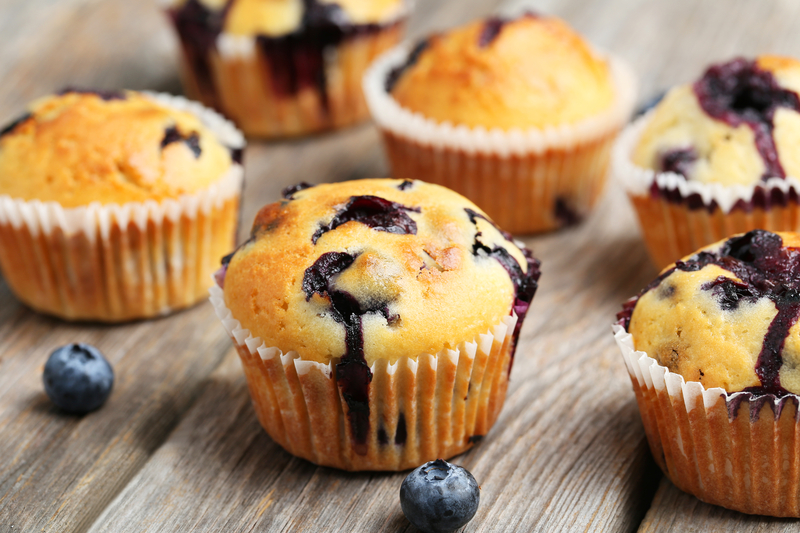 Muffins, those delightful little baked goods, have been a staple in kitchens around the world for generations.
Muffins, those delightful little baked goods, have been a staple in kitchens around the world for generations.
One of the key factors that determine the texture and rise of muffins is the leavening agent used.
In this article, we’ll explore the science behind what makes muffins rise and whether baking soda or baking powder is the better choice for achieving that perfect muffin height.
Understanding Leavening Agents
Before we dive into the specifics of baking soda and baking powder, it’s essential to understand the role of leavening agents in baking.
Leavening agents are ingredients that create gas bubbles within the batter or dough, causing it to rise and become light and fluffy.
The most common leavening agents in baking are baking soda and baking powder.
Baking Soda – The Power of Alkalinity
 Baking soda, also known as sodium bicarbonate, is a white crystalline powder with a slightly alkaline pH.
Baking soda, also known as sodium bicarbonate, is a white crystalline powder with a slightly alkaline pH.
It plays a critical role in making muffins rise by interacting with acidic ingredients in the batter.
Here’s how it works:
- Acid-Base Reaction: Baking soda requires an acidic component in the recipe to activate. Common acidic ingredients include buttermilk, yogurt, vinegar, or citrus juice. When baking soda reacts with an acid, it produces carbon dioxide gas, which forms bubbles in the batter, causing it to rise.
- Immediate Rise: Baking soda produces carbon dioxide gas as soon as it comes into contact with an acid. This means that muffins made with baking soda tend to rise quickly, so it’s essential to get them into the oven promptly to capture that rise.
- Flavor Impact: Baking soda can affect the flavor of your muffins if not properly balanced with acidic ingredients. Too much baking soda can lead to a bitter taste in your baked goods.
Baking Powder – The Double-Acting Leavener
Baking powder is a leavening agent specifically designed for baking.
Unlike baking soda, it contains both an acid (usually cream of tartar) and a base (usually baking soda) in a dry, powdered form.
This dual-action nature of baking powder offers some distinct advantages:
- Delayed Activation: Baking powder is “double-acting,” meaning it releases carbon dioxide gas in two stages. The first release occurs when the powder mixes with wet ingredients, and the second release happens during baking. This provides a more extended rise time, resulting in muffins that are often lighter and fluffier.
- Versatility: Baking powder can be used in recipes that don’t contain acidic ingredients because it already contains an acid component. This makes it a more foolproof choice for achieving a consistent rise.
- Neutral Flavor: Baking powder typically has a neutral flavor, so it won’t impart any unusual tastes to your muffins.
Choosing the Right Leavening Agent
 Now that we’ve examined the characteristics of both baking soda and baking powder, how do you decide which one to use when baking muffins?
Now that we’ve examined the characteristics of both baking soda and baking powder, how do you decide which one to use when baking muffins?
It depends on the recipe and the desired outcome:
- Baking Soda: If your muffin recipe contains ample acidic ingredients like buttermilk, yogurt, or fruit puree, using baking soda can lead to a quick and robust rise. Be cautious not to overdo it, as too much baking soda can result in an unpleasant taste.
- Baking Powder: Baking powder is a more versatile choice and can be used in recipes with less acidity. It provides a more controlled and extended rise, resulting in muffins that are often lighter and more evenly textured.
Bottom Line – What Makes Muffins Rise: Baking Soda or Baking Powder?
In the age-old debate of baking soda vs. baking powder for muffins, both leavening agents have their merits.
Baking soda is excellent for recipes rich in acidic ingredients, offering a quick rise but requiring careful balancing.
On the other hand, baking powder is a more foolproof choice, offering a delayed and extended rise, making it suitable for a wider range of muffin recipes.
Ultimately, the choice between baking soda and baking powder comes down to your specific recipe and desired texture.
Experimentation in the kitchen can help you find the perfect balance to create muffins that rise to perfection every time.


